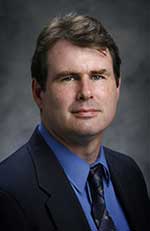Richards College of Business Hosts Annual Economic Breakfast
by Amy K. Lavender
At the annual Economic Forecast Breakfast recently hosted by the University of West Georgia’s Richards College of Business, business and community leaders received some good news: things are looking up for west Georgia.

Dr. Joey Smith
According to Department of Economics Chair Dr. Joey Smith, west Georgia is seeing a rise in the labor market as well as a reduction in unemployment claims.
"Which means despite the fact we have more people entering the workforce, those people are still able to find jobs," said Dr. Smith.
Unemployment is down to 5.7 percent from last year's 6.9 percent, and initial unemployment claims are so low they are below pre-recession rates. The west Georgia region, which includes Carroll, Douglas, Coweta, Haralson, Heard, and Polk Counties, added 5,634 jobs in the past year – substantially more than the year before. Most of that job growth was in the healthcare, manufacturing, and service industries.
"This is good because it provides us with a variety of jobs for people of various skill levels, and it provides many individuals with high-quality, high-paying, stable jobs," Dr. Smith said.
The West Georgia housing market has also recovered substantially, and prices remain low. Additionally, housing interest rates have remained at lows not seen since the 1960s. Local residents are also enjoying low fuel prices.
“Basically, unemployment rates continue to fall, we’ve created more jobs, and manufacturing remains strong and is growing because everything we make in west Georgia is in high demand,” Dr. Smith said during the breakfast.
Georgia Labor Commissioner Mark Butler also spoke at the breakfast, saying that job growth has also been the trend across the state.
“Georgia is consistently in the top 10 for job growth in the United States,” he reported. “We lost more than 300,000 jobs from 2008 to 2010, mostly in manufacturing and construction. But we’ve been gaining jobs since then, and this year alone we gained 84,200 jobs. That’s about a 2 percent growth from last year.”
However, Butler admitted that a lot of work was still left to be done if the state is going to meet its employment needs.
“We have a talent and skills gap,” Butler reported. “We have employers trying to fill jobs and can’t find qualified people to fill those positions.”
According to Butler, 60 percent of the newly created jobs in Georgia require an associate’s degree or higher. This requires more workers to acquire a higher education, but often means they are entering an unfamiliar socio-economic bracket and don’t have the soft skills required for the jobs they are trying to get into.
“We have people going to job interviews in blue jeans and pajamas,” Butler said. “And the number one complaint I hear from business owners is that people don’t show up for work on time. These same business owners tell me they would rather hire a person with good soft skills and train them for their job rather than hire someone with the skills required for the job who isn’t dependable.”
Butler touted the success of several state programs, such as Georgia BEST (Business Ethics Student Training), JGG (Jobs for Georgia Graduates) and other programs, that have helped connect people with jobs and the skills they need to succeed in today’s workforce.
“We can overcome [this qualification gap],” Butler told the audience, “but we need to work together and grow a pipeline of qualified workers to fill these jobs.”
Dr. Lawrence Yun, who creates the annual economic forecast for the National Association of Realtors, also spoke to the crowd gathered for the breakfast about the positive direction the nation is headed economically.
“Despite global inconsistencies, the housing market is doing well enough to see positive movement in the United States,” he reported. “Georgia does better than the national average, mainly because of Atlanta, and as goes Atlanta so goes the state. And Carrollton follows the lifting tide of Atlanta.”
Dr. Yun reported that the unemployment rate has dropped so dramatically in the past couple years that it’s no longer a good indicator of how the market is doing. In fact, it is better to look at the labor pool to see how many are entering it and how many are finding jobs.
“Even though we are creating new jobs, we also have new graduates looking for jobs each year,” Dr. Yun said.
He explained that some areas are doing better than others at employing this large pool of people.
“States that have economies heavily dependent on energy aren’t doing as well as those with economies that depend on housing,” he said. “This is why Georgia is doing a little bit better than other states.”
Dr. Yun reiterated that as companies continue to add jobs in Atlanta, that growth and expansion will reverberate throughout the rest of the state.
Do you have a comment or opinion about this story's topic? Perspective Online wants to hear from you. Submit a letter to the editor today.
